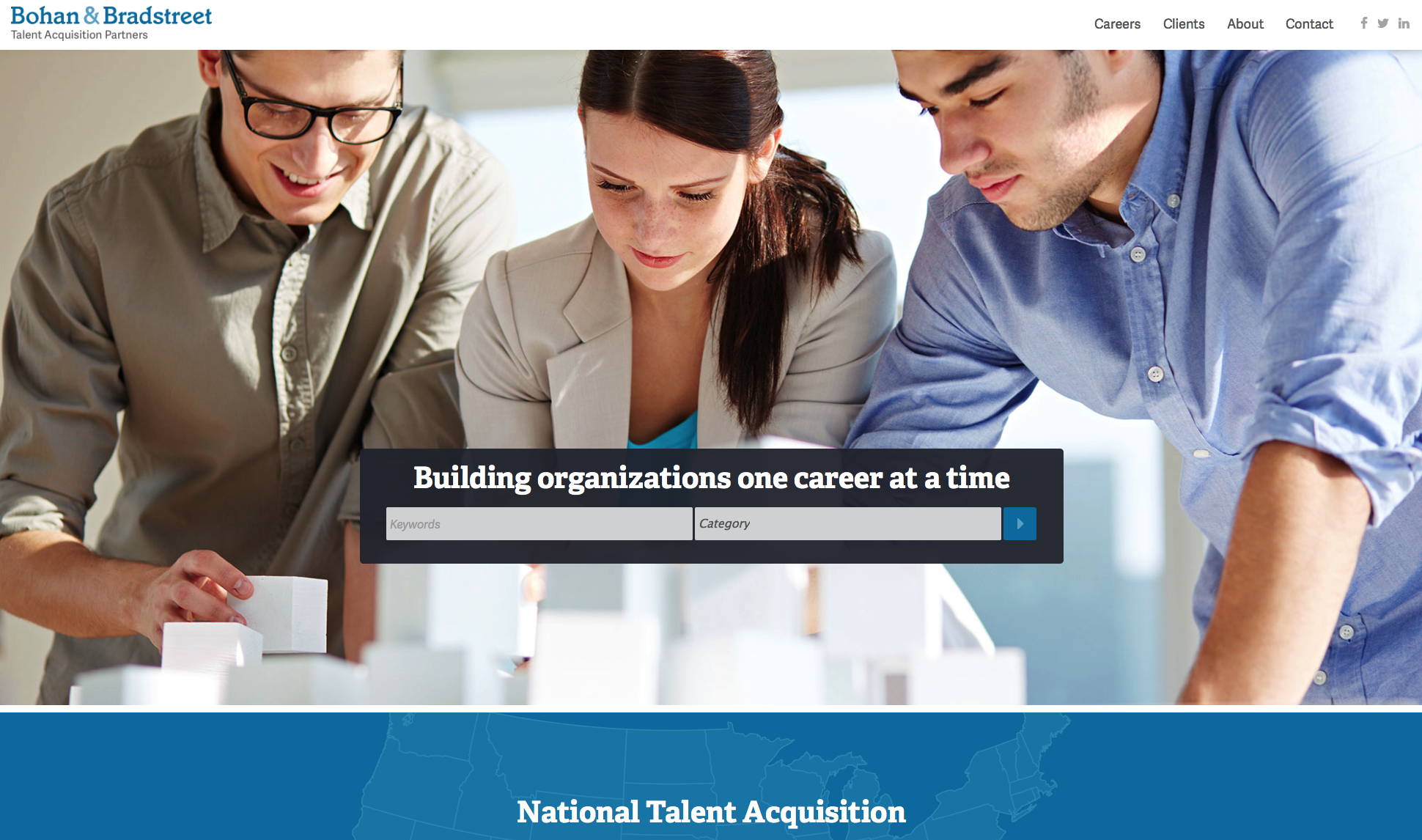Tuesday, December 15, 2015
by julie

The DHI Group Inc.time-to-hire index, a measure of the time it takes U.S. companies to fill jobs, rose to a record 29 working days in July.
See the below excerpt from the September 2015 article in the Wall Street Journal.
"The latest trend in hiring has a lot in common with speed-dating.
Fed up with recruiting that takes weeks or months, employers are experimenting with ways to take on new employees in a matter of days or even hours. Chipotle Mexican Grill Inc. made a highly publicized push last week to hire 4,000 workers in a single day, and other technology and media companies are accelerating the way they woo and acquire talent, from entry-level..."
Click here to read the full article.
Let B&B take the guess work out of the equation. We deliver "finalists" to you and help "sell" your story to candidates. We serve as an extension of your brand and business model.




 Top
Top
Thursday, December 10, 2015
by julie
 The shift in power to the candidate means current approaches will stop working - 83 percent of recruiters report that the power has shifted away from where it has been for years, the employer, and toward the candidate. Now that top candidates are in the driver's seat, the best have multiple options, recruiting must dramatically increase hiring speed, offer a great candidate experience, and shift to an emphasis away from assessment and toward excellence in "selling candidates."
The shift in power to the candidate means current approaches will stop working - 83 percent of recruiters report that the power has shifted away from where it has been for years, the employer, and toward the candidate. Now that top candidates are in the driver's seat, the best have multiple options, recruiting must dramatically increase hiring speed, offer a great candidate experience, and shift to an emphasis away from assessment and toward excellence in "selling candidates."- Shifting to compelling offers becomes essential - during the down economy, almost any offer was accepted. However, in today's marketplace where top candidates get multiple offers, the offer generation process must be radically updated. That means that sign-on bonuses, exploding offers, and identifying and meeting an individual candidate's job acceptance criteria will become essential once again.
- Perhaps the biggest surprise will be the shortage of top recruiters - as recruiting volume and difficulty both ramp up, firms will begin to realize that there is a significant shortage of talented and currently up-to-date recruiters.
- Videos begin dominating recruiting messaging - If you're not already using video job descriptions, videos for employer branding, video employee profiles, video job postings and video job offers, you need to realize that authentic videos are an essential supplement to all traditionally print messaging. Videos make it easier to see and feel the excitement at your firm.
- Learning to hire whenever scarce talent becomes available - during periods when top talent is extremely scarce, the best targets enter and exit the job market over a matter of days. That means that recruiting functions must shift from their traditional recruiting model, where you hire only when a position becomes open, to a completely different approach, where you hire whenever top talent is available to your company.
- Sourcing will add a "find-their-work" component -With the growth of the Internet and social media, it is now becoming possible to find the actual work of most professionals. There will be a focus on discovering the great ideas and the writing, the pictures, and the video representations of their work.




 Top
Top
Tuesday, December 8, 2015
by julie

We recently launched an updated company website, inclusive of a mobile-friendly version. The new website will offer you the following:
- Easier navigation
- Better career search functionality
- Applicable content
Visit our new website at http://www.bohanbradstreet.com/ and share your feedback with us.
For those exploring new careers, please note we update career opportunities on a daily basis, so check back regularly. Also, please know we only advertise a sample of the careers we are representing, so please call us if you are interested in working with us.




 Top
Top
Wednesday, December 2, 2015
by julie

The Junior Achievement 'Partners in Achievement Breakfast' in New Haven was a huge success!
We watched and listened to Rayane, an 8th grader, emcee the breakfast with great poise and confidence. We witnessed Trey, a 6th grader, share how Junior Achievement opened his eyes to the world of global business. And we were awed by Courtney, a 12th grader, talking about how the Junior Achievement 'Company Program' changed her life.
On Friday, November 13th 2015, Junior Achievement broke records in New Haven. The breakfast was packed with more than 160 guests and the event beat its capital raising goal.
Please consider volunteering your time to Junior Achievement.http://jaconn.org/volunteer/
Click here to watch a clip from WTNH on the 'Partners in Achievement Breakfast' event.




 Top
Top
Tuesday, November 24, 2015
by julie

A key driver for success in a B2B manufacturer of machined products was engineering ingenuity and the ability to be ahead of the curve. The VP Engineering was an innovator and design expert but not a natural leader. Turnover had plagued the department. Due to business growth and forecasts, plans were to hire additional engineers and B&B was asked to partner on the recruitment of a new role, an Engineering Manager, who would manage, mentor and develop talent and report to the VP Engineering.
B&B met with the CEO, COO and VP of Human Resources to best understand the recent history and evolution of the business, current organization structure, customer base, product development cycle, engineering success, challenges due to turnover in engineering, culture, expectations of internal and external stakeholders, reinvestment into employees and company, engineering career pathing, and so on. B&B probed about the VP Engineering to better understand strengths, weaknesses, value, soft skills, and key drivers.
B&B was asked to comment and complimented the executive team on the success of the business but declined to take on the search as originally defined because the company was masquerading the real issue and that is that the VP Engineering is better at relating with products than people. B&B explained that there are two key challenges that were presented. First, the VP Engineering is a talented product developer, gains gratification from product development, and to maximize value going forward needs to key on product development. Second, the company needs to hire and develop additional engineering talent. B&B recommended changing his title to VP Product Development and assign staff on a project basis only. To solve the second challenge B&B recommended hiring a more senior leader with a history of managing and developing engineering talent who would report to the COO and have dotted line responsibility to the VP of Product Development. B&B was engaged, identified a select slate of candidates and completed the Engineering Director search within 38 business days. The incumbent VP was thrilled to concentrate on product development and the new hire was later promoted to VP Engineering.




 Top
Top


 The shift in power to the candidate means current approaches will stop working - 83 percent of recruiters report that the power has shifted away from where it has been for years, the employer, and toward the candidate. Now that top candidates are in the driver's seat, the best have multiple options, recruiting must dramatically increase hiring speed, offer a great candidate experience, and shift to an emphasis away from assessment and toward excellence in "selling candidates."
The shift in power to the candidate means current approaches will stop working - 83 percent of recruiters report that the power has shifted away from where it has been for years, the employer, and toward the candidate. Now that top candidates are in the driver's seat, the best have multiple options, recruiting must dramatically increase hiring speed, offer a great candidate experience, and shift to an emphasis away from assessment and toward excellence in "selling candidates."

